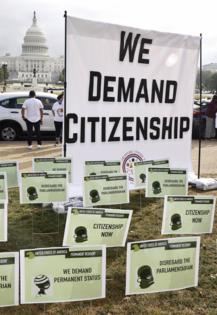Just days after Trump's inauguration, US Citizenship and Immigration Services updates a crucial green card requirement
Published in News & Features
Just days after Donald Trump’s arrival at the White House, the United States updated its requirements for applicants seeking adjustment of immigration status through permanent residence or green card.
The change went into effect on Jan. 22, according to the United States Citizenship and Immigration Services announcement in a press release.
The measure particularly affects the filing of Form I-693, Immigration Medical Examination Report and Vaccination Record.
—USCIS removes a vaccination requirement for green card applicants
USCIS will no longer require proof of coronavirus vaccinations from applicants seeking adjustment of status to lawful permanent resident.
USCIS announced that it is “waiving any and all requirements requiring applicants for adjustment of status to be a lawful permanent resident to submit documentation on their Form I-693” and COVID-19 vaccination records as evidence, the agency said.
Therefore, USCIS “will not issue any Request for Evidence (RFE) or Notice of Intent to Deny (NOID) related to demonstrating COVID-19 vaccination.”
“USCIS will not deny any application for adjustment of status based on the applicant’s failure to submit documentation proving that he or she received the COVID-19 vaccine,” the immigration agency said.
—Key changes to Form I-485 and green card application process
On Feb. 10, USCIS will impose changes to the green card application through Form I-485, when it will begin to accept only a particular edition of the document — the Oct. 24, 2024 edition of the form in question, available online.
It will also require applicants for permanent residence to file or submit a Form I-693, or a partial Form I-693 (such as a vaccination record), along with their green card application. USCIS has warned that it may reject applications from those who do not file Form I-693 with Form I-485 when required.
—How does the Trump administration policies could affect adjustment of status?
With a hard-line anti-immigration rhetoric, the new Trump administration has made several promises that threaten the legal adjustment of many people in the U.S. today.
During his first term, Trump issued an executive order to temporarily suspend the issuance of certain permanent residence cards. But at the time, it was a measure to address the labor challenges of the coronavirus pandemic.
On his first day in office for his second term, the new president signed several executive orders that would put an end to multiple immigration benefits that had been in place during the outgoing administration.
Among the initial actions was the elimination of humanitarian parole for Venezuelans, Cubans, Nicaraguans and Haitians. However, so far there is no known government measure that directly affects the adjustment of status for a green card.
_____
©2025 Miami Herald. Visit miamiherald.com. Distributed by Tribune Content Agency, LLC.







Comments